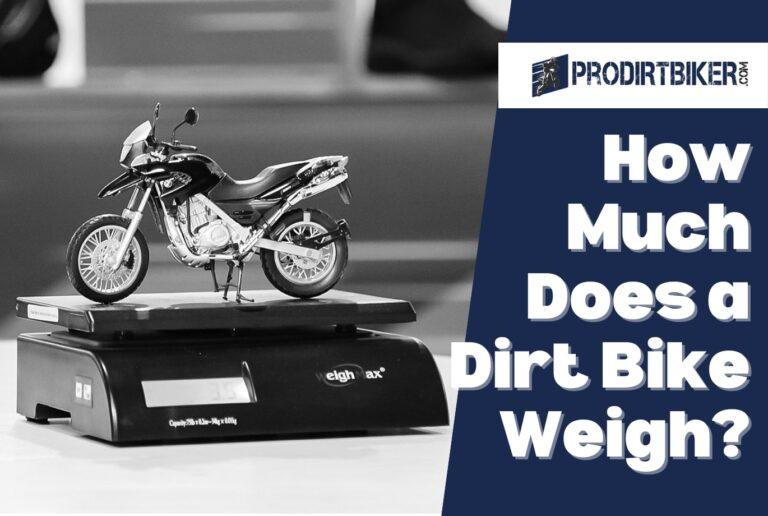Why Are Dirt Bikes Illegal? Unveiling the Truth
Dirt bikes are illegal on the street because they lack the required lights, turn signals, insurance, and licensing needed to legally ride on the road. Dirt bikes are made for off-road use only and do not meet the necessary safety standards for street vehicles.
Consequently, riding dirt bikes on public streets poses a risk to both the rider and other road users. In order to make a dirt bike street legal, it would need to have a VIN, be registered and titled, and be equipped with a speedometer, headlights, and taillights.
This ensures compliance with road safety regulations and allows for safe and legal riding on public streets. However, without meeting these requirements, dirt bikes remain prohibited on the road.
Understanding The Laws And Regulations
Understanding the Laws and Regulations When it comes to dirt bikes, there is often confusion surrounding their legality and why they are considered illegal in many places. Understanding the laws and regulations surrounding dirt bikes can shed light on why they are not allowed on public roads and trails. By delving into the legal status of dirt bikes, exploring the factors contributing to their illegal status, and examining local and state laws that restrict their use, we can gain a clearer understanding of why dirt bikes are prohibited in certain areas.The Legal Status of Dirt Bikes: A Brief Overview
Dirt bikes, also known as off-road motorcycles, are designed and manufactured for use in off-road environments such as trails and dirt tracks. They are specifically engineered to tackle rugged terrains and perform stunts or jumps. However, these bikes are not equipped with essential safety features required for street-legal vehicles, such as turn signals, headlights, and mirrors. As a result, dirt bikes are generally not considered street legal in most jurisdictions.Factors Contributing to the Illegal Status of Dirt Bikes
Several factors contribute to the illegal status of dirt bikes. First and foremost, dirt bikes lack the necessary safety features to comply with the standard requirements for street-legal vehicles. These safety features play a crucial role in ensuring the safety of riders and other road users. Without them, dirt bike riders are at a higher risk of accidents or collisions on public roads. Additionally, dirt bikes are often used for off-road activities that are not permitted on public lands. This includes riding in designated protected areas, nature reserves, or private properties without permission. Such unauthorized use not only poses a threat to the environment but also disrupts the natural habitat and wildlife.Examining Local and State Laws: Restrictions on Dirt Bike Use
It is important to recognize that the legality of dirt bikes can vary from one jurisdiction to another. Local and state laws play a significant role in determining where dirt bikes can be ridden legally. These laws often restrict the use of dirt bikes to specific areas designated for off-road recreational purposes, such as designated motocross tracks or private properties with the owner’s consent. Furthermore, noise regulations may also contribute to the illegal status of dirt bikes. Many jurisdictions have specific noise ordinances in place to prevent excessive noise pollution. Since dirt bikes tend to produce loud engine sounds, they may fall afoul of these regulations, making them illegal in noise-restricted areas. In conclusion, understanding the laws and regulations surrounding dirt bikes can shed light on why they are often considered illegal. The absence of essential safety features, unauthorized off-road activities, and local/state laws restricting their use all contribute to the illegal status of dirt bikes in many areas. It is crucial for riders to familiarize themselves with the laws in their specific jurisdiction to ensure they are riding safely and legally.Safety Concerns And Public Perception
Dirt bikes, popular among motocross enthusiasts and thrill-seekers, are often met with mixed reactions. While some view them as exciting recreational vehicles, others argue that they pose significant safety concerns and have a negative impact on public safety. Additionally, public perception of dirt bikes is heavily influenced by factors such as noise pollution, environmental considerations, and media portrayal. In this section, we will explore the various aspects surrounding the safety concerns and public perception of dirt bikes.
The Impact of Dirt Bikes on Public Safety
When it comes to public safety, dirt bikes raise several concerns. One of the primary issues is the risk of accidents and injuries, both for the riders and pedestrians. Dirt bikes are designed for off-road use, meaning they are not equipped with the necessary safety features for street riding, such as lights, turn signals, and mirrors. This lack of proper equipment increases the likelihood of accidents and collisions, which can result in serious injuries or fatalities.
Besides the direct impact on safety, the reckless and aggressive behavior often associated with dirt bike riders can also put the public at risk. Unsanctioned racing, illegal modifications, and unauthorized use of public spaces are common issues that can disrupt traffic, create noise disturbances, and damage public property. It is essential to address these concerns to ensure the well-being and safety of both riders and the general public.
Noise Pollution and Environmental Considerations
In addition to safety concerns, dirt bikes also generate significant noise pollution. The loud engine noises emitted by dirt bikes can be disruptive and distressing for residents in both urban and rural areas. This constant noise can disturb the peace, affect quality of life, and contribute to heightened tensions between riders and local communities.
Furthermore, dirt bikes can have adverse environmental impacts. Off-road riding often leads to the destruction of natural habitats, erosion of soil, and damage to vegetation. This can not only harm ecosystems and wildlife but also degrade the aesthetics and usability of recreational areas. Striking a balance between the enjoyment of dirt bike enthusiasts and the preservation of the environment is crucial in addressing these environmental concerns.
Media Portrayal and Public Opinion of Dirt Bikes
The portrayal of dirt bikes in the media significantly influences public opinion. Unfortunately, media coverage often focuses on the negative aspects, highlighting illegal activities, dangerous stunts, and illegal racing. This portrayal can perpetuate a negative stereotype of dirt bike riders and contribute to public apprehension and hostility towards the activity.
Public opinion plays an important role in shaping legislation and regulations surrounding dirt bikes. The perception that dirt bike riding is inherently unsafe and disruptive can lead to stricter laws against their use on public roads and stricter enforcement by law enforcement agencies. It is crucial to foster a more balanced and informed public perception by highlighting responsible and law-abiding riders who contribute positively to the community.
Enforcement Challenges And Alternatives
Dirt bikes are exhilarating vehicles that provide riders with a unique off-road experience. However, their use on public roads and in urban areas poses significant challenges for law enforcement agencies. In many jurisdictions, dirt bikes are illegal to ride on the streets due to safety concerns and the potential for public nuisance. Despite their illegality, dirt bike riders continue to ride on streets, causing disturbances and endangering themselves and others.
Why Police Departments Do Not Always Chase Dirt Bike Riders
When it comes to law enforcement, the decision to chase dirt bike riders depends on various factors, including the policies of the police department and the circumstances at hand. Police departments do not always engage in high-speed pursuits of dirt bike riders for several reasons:
- Risk to public safety: High-speed chases involving dirt bikes can pose significant risks to the safety of pedestrians, motorists, and even the riders themselves. The unpredictable nature of dirt bike riding makes it difficult for police officers to safely pursue them without endangering innocent bystanders.
- Resource allocation: Police departments have limited resources, and engaging in pursuits can divert valuable manpower and vehicles away from addressing other pressing crimes and emergencies.
- Legal complexities: The legal framework surrounding pursuits can be complex, and officers need to consider liability issues and the potential for accidents or injuries during a chase.
- Alternative methods: Instead of engaging in high-speed pursuits, some police departments focus on alternative methods to address the issue of illegal dirt biking, such as proactive community policing, targeted enforcement initiatives, and public awareness campaigns.
Alternatives to Illegal Dirt Bike Use: Off-Road Parks and Private Land
While dirt bike riders may face challenges in legally riding these vehicles on public roads, there are alternatives available that allow enthusiasts to enjoy their sport without breaking the law. Off-road parks and private land provide designated areas for dirt bike riding, ensuring both safety and adherence to legal requirements. These locations often offer a range of trails and tracks specifically designed for dirt bikes, allowing riders to experience the thrill of off-roading in a controlled environment.
Possible Solutions to Address the Illegal Dirt Bike Issue
The issue of illegal dirt bike use can be addressed through a combination of measures aimed at enforcement, education, and providing legal alternatives for riders. Some possible solutions include:
- Increased enforcement: Law enforcement agencies can allocate resources to targeted enforcement efforts, cracking down on illegal dirt bike use and issuing citations to offenders.
- Collaboration with off-road parks: Police departments can work closely with off-road parks and private landowners to promote legal dirt bike riding and encourage riders to utilize designated areas.
- Education and outreach: Public awareness campaigns and educational programs can help inform riders about the laws and regulations surrounding dirt bike use, emphasizing the importance of safety and responsible riding.
- Legal reforms: Legislators can explore potential legal reforms to provide a framework for street-legal dirt bikes, ensuring that manufacturers produce vehicles with the necessary safety features for on-road use.
By addressing the challenges associated with illegal dirt bike use and providing viable alternatives, communities can strike a balance between the enjoyment of dirt bike riding and the need to maintain public safety and order.

Credit: press.husqvarna-motorcycles.com
Frequently Asked Questions On Why Are Dirt Bikes Illegal
Why Do Police Not Chase Dirt Bikes?
Police do not chase dirt bikes unless the rider poses a threat to public safety or is suspected of a crime. It depends on the circumstances and the police department’s policy.
Are Dirt Bikes Street Legal In The Us?
No, dirt bikes are not street legal in the US. To be considered street legal, a dirt bike must have a VIN, be registered and titled, and have a valid license plate. It must also be equipped with a speedometer, headlight, and taillight.
Can You Ride A Dirt Bike On Road In Wv?
In West Virginia, it is not legal to ride a dirt bike on the road. Dirt bikes are designed for off-road use only and do not have the required lights, turn signals, insurance, or licensing to be ridden legally on public roads.
Can You Ride A Dirtbike On The Road Idaho?
No, you cannot ride a dirtbike on the road in Idaho. Dirtbikes are not street legal and do not have the required documentation to ride legally on the road.
Why Are Dirt Bikes Not Street Legal In Most States?
Dirt bikes are not street legal because they lack the necessary mechanical safety features required by the U. S Department of Transport (DoT).
Conclusion
Dirt bikes are illegal in many places due to their lack of essential safety features and required documentation, such as a license and inspection certificate. These off-road vehicles are not designed for street use and do not meet the regulatory standards for roadworthy transportation.
However, if you intend to ride strictly off-road, insurance and registration may not be necessary. It’s important to understand the laws and regulations in your specific location to ensure compliance and safety while enjoying dirt biking.


